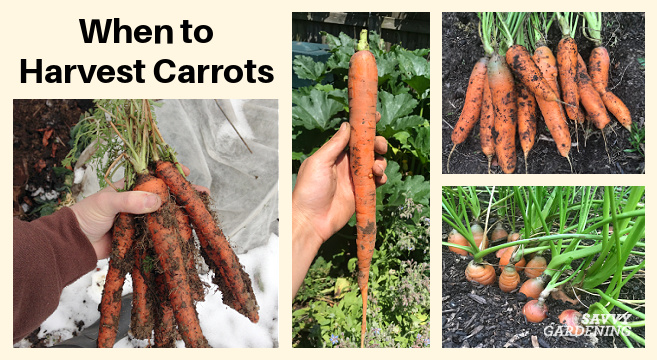Introduction
According to me, while growing your own harvest carrots🥕 can be enjoyable, knowing when to harvest them can be a little challenging. They might not have grown to their full potential and might be undersized and unripe if you harvest them too soon. On the other hand, if you wait too long to harvest them, they can turn harsh and woody, which would make them less tasty to consume. We’ll go over how to harvest carrots🥕 at the right time in this article so you can savour the best-tasting, fully developed carrots🥕 from your garden.
How to Know When to Harvest Carrots : Watching This Video
How to Know When to Harvest Carrots
Here are some key signs to look for when determining if your carrots are ready to be harvested:
- Carrot🥕 Size: Observing the size of your carrots🥕 is one of the simplest ways to determine when they are ready for harvest. You should anticipate your mature carrots🥕 to be between 1-2 inches in diameter and 6-8 inches long, depending on the variety you are growing. If they haven’t grown to this size yet, it’s better to give them a little more time in the ground so they can mature completely.
- Carrot🥕 Colour: The colour of your carrots🥕 is another clue as to whether or not they are ready for harvest. Although most varieties of mature carrots🥕 are orange, some can also be yellow, purple, or even white. It may indicate that they haven’t fully matured if the colour is pale or dull.
- Carrot🥕 Top: The foliage or top of the carrot🥕 can also serve as a harvesting cue. The carrots🥕’ tops should be a vibrant green colour; if they start to turn yellow, it means the carrots🥕 are almost time to harvest.
- Carrot🥕 Texture: You can also dig up a small area of the garden bed around a carrot🥕 to examine its texture to see if it is ready to be harvested. A mature carrot🥕 should feel smooth and sturdy to the touch, with just a little give. It’s preferable to leave them in the ground for a little while longer if the soil is too soft or hard.
- Taste of carrot🥕: The carrots’🥕 ability to taste is the final and most important indicator of harvest readiness. They are grown and ready to be harvested if they taste sweet and tasty.

FAQs
There isn’t a particular hour of the day that is preferable to others for harvesting carrots🥕. To prevent harming them or spreading illness, it is best to pick them when the earth is dry.
Since too much wetness can cause disease and rot, it is preferable to avoid harvesting carrots🥕 in the rain.
Before harvesting carrots🥕, they do not need to be washed. In fact, bathing them may increase their susceptibility to disease and rotting.
Depending on the variety and growing circumstances, carrot🥕 maturation times can vary. However, from planting to harvest, it typically takes 70 to 80 days.
Thin out your carrot🥕 patch before harvesting so that the surviving carrots🥕 have more room to thrive.
You can harvest young carrots, but wait until they are a respectable size to do so.
Carrots🥕 that have been harvested need to be kept in a cool, dark, and dry location, like a root cellar or the fridge.
Some gardeners opt to leave carrots🥕 in the ground over the winter, but it’s crucial to watch out for too much ground freezing or they could suffer damage.
Additional FAQs of How to Know When to Harvest Carrots
Remove the tops and any extra soil from the carrots🥕 before storing them, but don’t wash them. Then put them in a container that can breathe, like a plastic bag that has been punctured.
Carrots🥕 are no longer fit for human consumption once they have bolted and sent up a blossom stalk. You can still save the seeds, though, in order to plant more seeds in the future.
Carrots🥕 that are overripe will be rough, woody, and flavorful. It’s better to remove these warnings from the ground and throw them away if you see them.
A: Carrots🥕 are finished once they have been harvested. To ensure a constant supply of fresh carrots🥕 throughout the growing season, you can space out your plantings.
Yes, you can keep carrots🥕 alongside other veggies as long as they are not in close proximity to each other to prevent cross-contamination.
Yes, you can blanch and freeze carrots🥕 after they’ve been collected.
Carrot🥕 tops can be used in salads, pestos, and other foods, and they are edible.
Conclusion
According to me, to guarantee that you are obtaining the best-tasting, fully matured carrots🥕 from your garden, you must know when to harvest your carrots🥕. To identify when your carrots🥕 are ready to be picked, consider the size, colour, top, texture, and flavour. To keep them as fresh as possible for as long as possible, remember to store them carefully. Enjoy your harvest!